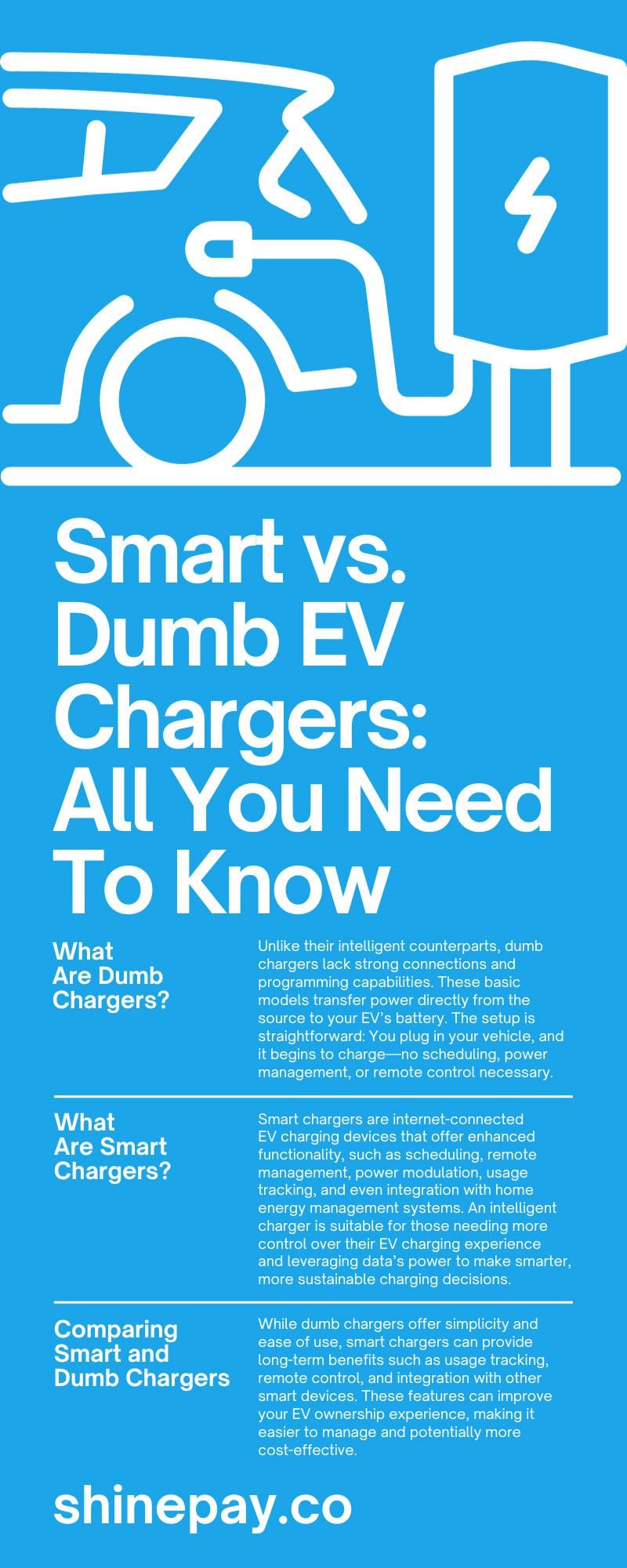Commercial property owners looking to jump into the world of electric vehicles (EVs) have outstanding odds at creating a successful stream of side income. However, the joy of investing in this green path comes with complex junctions—one of which is the choice of an EV charger. EV chargers aren’t all equal; some are regarded as “dumb,” with fewer features compared to their “smart” alternatives, but not every business will benefit from these smart chargers. Not understanding the pros and cons of both could put you in a tough spot. Explore all you need to know about smart and dumb EV chargers so that you can make an informed, sustainable decision for your property. Let’s plug in and start learning!
Understanding EV Chargers
Electric Vehicle (EV) chargers, also known as EV supply equipment (EVSE), are the crucial links that connect your EV to the electric grid. They replenish your EV’s battery, converting alternating current (AC) from your local grid to direct current (DC) to store in the vehicle’s battery.
There are primarily two types of chargers: Level 1 and Level 2. A Level 1 charger utilizes a standard 120-volt AC household outlet, while a Level 2 charger uses a 240-volt AC outlet (like your washer or dryer), offering faster charging speeds.
Here’s where the “smart” and “dumb” delineation comes into play. The Level 1 and Level 2 chargers can be either “smart” or “dumb,” but this classification often refers to their level of sophistication and connectivity. Stick with us as we delve deeper into what makes a charger fall into either category and how this impacts your EV charging experience.
Dumb Chargers
Dumb chargers, or basic EV chargers, are straightforward in functionality. They consistently charge your EV whenever you connect it, but they do not have additional features. Think of them as the generic option in the EV charging world.
What Are Dumb Chargers?
Unlike their intelligent counterparts, dumb chargers lack strong connections and programming capabilities. These basic models transfer power directly from the source to your EV’s battery. The setup is straightforward: You plug in your vehicle, and it begins to charge—no scheduling, power management, or remote control necessary.
Pros and Cons of Dumb Chargers
There are pros and cons on each side of the coin, especially for dumb chargers. While they’re an affordable option and best for those starting in the EV charging world, they cannot schedule charging for off-peak hours, which could lead to higher electricity costs. They also provide no usage data, so there is no way to track energy consumption.
When To Choose Dumb Chargers
A dumb charger could be the best choice when you need a cost-effective, simple solution and when missing out on advanced features isn’t consequential. A dumb charger is best for those needing an overnight charge, such as guests and tenants at college campuses, hotels, and apartment complexes. Sometimes, simplicity really is the best solution.
Smart Chargers
Meanwhile, smart chargers are on the high-tech end of the EV charging spectrum. They offer more benefits to users than simply charging their vehicles. A person can track the EV charging process from their smartphone and even control and optimize their charging experience.
What Are Smart Chargers?
Smart chargers are internet-connected EV charging devices that offer enhanced functionality, such as scheduling, remote management, power modulation, usage tracking, and even integration with home energy management systems. An intelligent charger is suitable for those needing more control over their EV charging experience and leveraging data’s power to make smarter, more sustainable charging decisions.
Pros and Cons of Smart Chargers
A smart EV charger has pros and cons, just like a simple dumb charger. One obvious advantage is the smart charger’s advanced programming capabilities, such as scheduling off-peak hour charging to save on electricity costs and remote control for convenience. They also provide usage data, which can be invaluable for tracking energy consumption and planning. However, these advanced chargers are more expensive than dumb chargers, and having an array of features could be overwhelming or unnecessary for some.
When To Choose Smart Chargers
If you value control, data, and the convenience of managing your charging process remotely, a smart charger could be the perfect choice. The best time to choose a smart charger is if you’re looking to benefit from time-of-use rate plans, a scheduling system allowing users to schedule charging sessions at cheaper times. Time-of-use rate plans can help business owners, giving commuting customers the best times to use EVs at affordable prices.
Comparing Smart and Dumb Chargers
When comparing smart and dumb chargers, it’s essential to consider your needs, preferences, and lifestyle. Both chargers have pros and cons; the best one for your business depends on your circumstances.
Performance Comparison
In terms of performance, both smart and dumb chargers can deliver the necessary power to charge your EV. The main difference lies in the control you have over the charging process. With a dumb charger, charging starts once the user plugs in the vehicle. With a smart charger, you can optimize the charging process based on your scheduled electricity rates. You can even integrate it into your home energy management system.
Cost Comparison
Dumb chargers cost less than smart chargers. However, the advanced features of smart chargers, such as scheduling charging sessions during off-peak hours when electricity is cheaper, can significantly lower your electricity bill costs over time. This benefit can offset the higher initial cost of a smart charger.
Long-Term Benefits
While dumb chargers offer simplicity and ease of use, smart chargers can provide long-term benefits such as usage tracking, remote control, and integration with other smart devices. These features can improve your EV ownership experience, making it easier to manage and potentially more cost-effective.
There’s no one-size-fits-all approach to choosing between a smart and a dumb EV charger. As you search for the best EV charger, ensure you learn all you can about smart and dumb chargers; having a greater knowledge base helps you make the best choice.
Both chargers have their place in the EV ecosystem. Choosing the right charger depends on your unique charging needs. Investing in commercial EV charging stations is about more than infrastructure—it’s a commitment to sustainability and a forward-thinking brand. Join us at The Harvesting Collective, where we strive to help companies invest in better technology for a brighter future (and extra side income). Embrace the electrifying journey of EV charging and drive growth for your business today. The future is electric!

